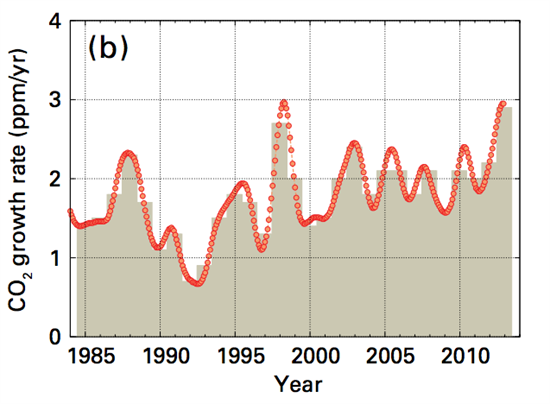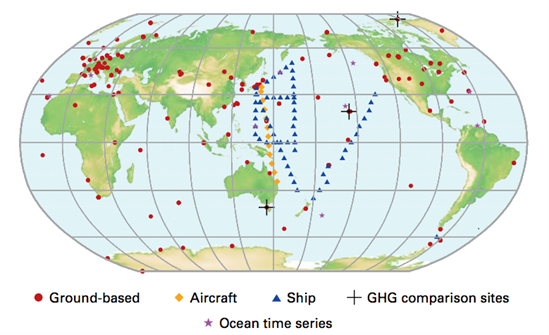Roz Pidcock
15.09.2014 | 3:25pmIn yesterday’s Telegraph, climate skeptic commentator Christopher Booker argues a recent BBC News piece makes claims about rising carbon dioxide that are “blatantly untrue”.
He also accuses the broadcaster of repeating theories about ocean warming that scientists have “ridiculed as make-believe”. But a quick look shows his accusations don’t stand up.
Carbon rising
In an article criticising the broadcaster for its climate science coverage, Booker cites a BBC radio news article on a recent World Meteorological Organisation (WMO) report.
The report looked in detail at carbon dioxide levels in the atmosphere, and how they’re changing. It found greenhouse gases reached a record high of 396 parts per million (ppm) in 2013 – that’s 42 per cent higher than pre-industrial levels.
Global carbon dioxide concentrations rose by nearly 3 ppm from 2012 to 2013 – the largest annual increase since 1984, the report also found.

Global growth in atmospheric carbon dioxide from 1984 to 2013 (shaded columns are annual averages). Source: WMO annual Greenhouse Gas Bulletin for 2013
“Blatantly untrue”
As Booker notes, the BBC picks up on this WMO finding. He says:
“The BBC’s radio news breathlessly told us that the need for a global climate treaty is now more urgent than ever because new figures from the World Meteorological Organisation (WMO) show that CO2 levels last year raced up faster than at any time since 1984”
But Booker claims the BBC’s statements about the WMO report are “blatantly untrue”. He cites data from the Mauna Loa observatory in Hawaii, which he says shows:
“[N]o fewer than nine years since 1984 have shown larger increases [in carbon dioxide than in 1984].”
Data shows that several recent years have seen carbon dioxide levels in Mauna Loa rise faster than in 1984, as Booker notes. But the point the new WMO report – and the BBC News article – makes is that it’s the first time that’s been the case right across the globe.
In other words, Booker’s claim that the BBC statements on the new WMO report are “blatantly untrue” is very firmly not the case. Booker looks solely at Mauna Loa – a valuable but remote and undisturbed part of the world – whereas the WMO takes a global view.

The WMO ‘Global Atmosphere Watch‘ programme combines measurements on land and from aircraft and ships across the world. WMO annual Greenhouse Gas Bulletin for 2013
Ocean warming
Booker also argues the BBC article makes “no mention of the fact that the trend in global temperatures has now shown no rise for 18 years”.
Surface temperatures – that’s the air above land and the surface of the ocean – have risen over the period Booker suggests, but not as fast as in previous decades.
Scientists say periods of slower warming aren’t unusual and the most likely explanation is that natural cycles are pushing heat into the deep ocean rather than staying at the surface.
According to Booker, this explanation was “recently ridiculed as make-believe” by leading oceanographer Professor Carl Wunsch. Back in July, Wunsch and colleague Patrick Heimbach published some research suggesting that some parts of the very deep ocean – the ‘abyss’ – have cooled slightly in recent decades.
Some parts of the media misinterpreted the research as contradicting scientists’ understanding of the role of the oceans in recent surface warming.
Graham Lloyd of The Australian said, for example:
“The deep oceans have been cooling for the past two decades and [so] it is not possible to say whether changes in ocean heat adequately explain the “pause” in global warming”.
Similarly, Booker wrote about the research at the time, claiming it marked a pouring of “magisterial cold water” on the theory of ocean warming as an explanation for the so called surface warming “slowdown”.
Cherry-picking
But Wunsch told us at the time, this interpretation “cherrypicks” bits from their paper and “misses some key points”. The Australian published a letter to the editor in which Wunsch described Lloyd’s argument as misleading and “likely to leave a mis-impression”.
The letter says:
“We never assert that global warming and warming of the oceans are not occurring – we do find an ocean warming, particularly in the upper regions.”
The authors make clear their findings are of little consequence for the so-called “pause”. The relevance of abyssal cooling is “tiny in a global warming context” and their findings are consistent with other scientific literature pointing to overall warming of the ocean, they say.
In yesterday’s article, Booker manages to rehash arguments scientists have deemed misleading, and misrepresent the significance of rising carbon dioxide in one fell swoop.

